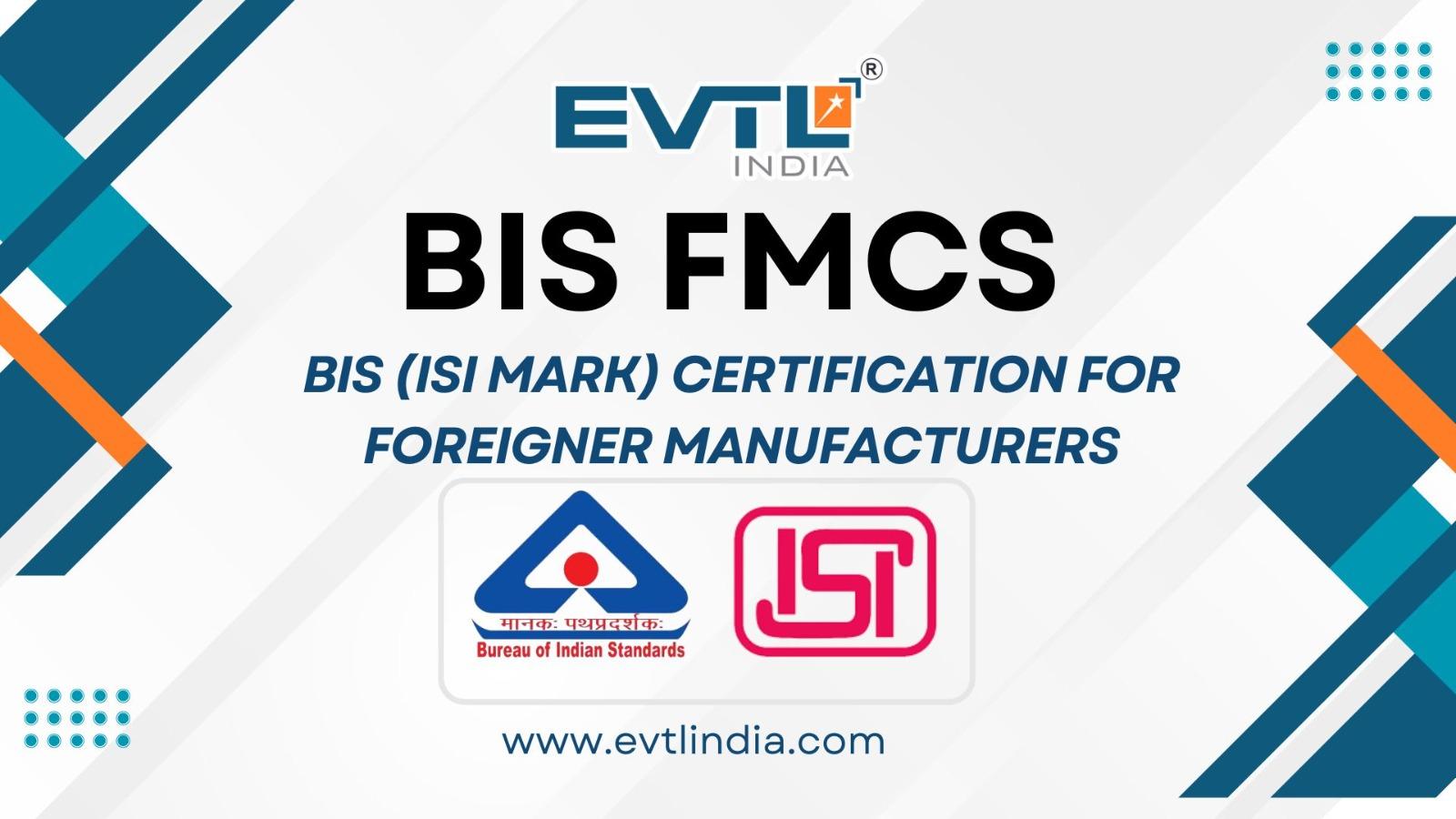BIS FMCS Certification: A Complete Guide for Foreign Manufacturers Seeking Indian Market Entry

Expanding into India’s rapidly growing market requires more than just demand—it requires compliance with Indian standards. The Bureau of Indian Standards (BIS) plays a crucial role in ensuring product quality, safety, and reliability. For foreign manufacturers, this means obtaining the BIS FMCS Certification (Foreign Manufacturers Certification Scheme) before launching products in India.
In this guide, we will explore everything about BIS FMCS Certification, its importance, procedure, challenges, and how the Top BIS FMCS Consultant can make the entire process seamless for manufacturers worldwide.
What is BIS FMCS Certification?
The Foreign Manufacturers Certification Scheme (FMCS) was introduced by BIS to allow overseas manufacturers to certify their products with the ISI Mark, the symbol of quality in India. Under this scheme, foreign companies can manufacture products in their home country and still sell them in India, provided they comply with Indian Standards.
This certification ensures that the same level of safety and quality required from Indian manufacturers applies to foreign manufacturers as well, creating a level playing field.
Why is BIS FMCS Certification Important for Foreign Manufacturers?
India’s market is one of the largest in the world, and compliance with BIS standards is mandatory for many products, especially in categories like electronics, appliances, building materials, and industrial goods.
Here’s why BIS FMCS Certification is crucial:
-
✅ Legal Requirement – Without FMCS certification, foreign companies cannot sell regulated products in India.
-
✅ Consumer Trust – ISI-marked products are seen as reliable and safe.
-
✅ Market Competitiveness – Certified products gain preference over uncertified imports.
-
✅ Brand Reputation – Compliance with BIS enhances global credibility and brand image.
-
✅ Smooth Entry into India – Avoids shipment rejections and customs hurdles.
Simply put, FMCS is the passport for foreign manufacturers to establish a strong foothold in the Indian market.
Scope of BIS FMCS Certification
The FMCS covers a wide range of products across industries. Some major categories include:
-
Electrical and electronic appliances – like refrigerators, washing machines, switches, and wires.
-
Construction materials – such as cement, steel bars, and pipes.
-
Chemicals and plastics – adhesives, fertilizers, and polymer-based items.
-
Household goods – cookware, toys, and sanitary ware.
-
Industrial machinery and parts – pumps, valves, and safety equipment.
If a product falls under the mandatory certification list by BIS, foreign manufacturers must obtain FMCS before exporting to India.
Step-by-Step Process of BIS FMCS Certification
Getting certified under the FMCS involves multiple stages. Here’s a simplified breakdown:
1. Application Submission
Foreign manufacturers apply to BIS with complete details of the product, manufacturing process, test reports, and quality management system.
2. Factory Inspection
BIS officials visit the manufacturing site in the foreign country to check infrastructure, testing facilities, and production quality.
3. Product Testing
Samples are drawn during inspection and sent to BIS-approved laboratories for testing as per Indian Standards.
4. Evaluation and Documentation
The BIS team reviews test results, documents, and compliance reports to verify the manufacturer’s capability.
5. Grant of License
If all requirements are met, BIS grants the ISI Mark Certification under FMCS, authorizing the manufacturer to use the ISI symbol on products.
6. Ongoing Surveillance
BIS conducts periodic inspections and surveillance to ensure continuous compliance with Indian standards.
Challenges Faced by Foreign Manufacturers
Although the FMCS certification is beneficial, foreign manufacturers often face difficulties:
-
🌐 Complex Documentation – Multiple legal and technical documents must be furnished.
-
🏭 On-site Inspection – Arranging factory audits by BIS officials can be time-consuming.
-
📑 Product Testing Delays – Lab testing as per Indian standards may take longer than expected.
-
⚖️ Regulatory Updates – BIS frequently updates QCOs (Quality Control Orders), requiring constant monitoring.
-
🛃 Customs Hurdles – Lack of BIS certification often leads to shipment rejections at Indian ports.
This is where a Top BIS FMCS Consultant becomes essential.
Role of a Top BIS FMCS Consultant
Navigating the FMCS process can be complex for foreign manufacturers unfamiliar with Indian compliance systems. A BIS FMCS consultant acts as a bridge between manufacturers and BIS authorities, making the process smooth and hassle-free.
Key Benefits of Hiring a BIS FMCS Consultant:
-
📌 Expert Guidance – Helps identify whether your product requires FMCS certification.
-
📌 Document Support – Prepares and verifies required technical and legal documents.
-
📌 Inspection Coordination – Manages BIS officials’ factory visits efficiently.
-
📌 Testing Assistance – Ensures samples are tested at recognized labs.
-
📌 Faster Approval – Reduces delays through proper follow-ups and compliance alignment.
-
📌 Post-Certification Support – Keeps track of license renewals and QCO updates.
By working with the Top BIS FMCS Consultant, manufacturers save time, reduce costs, and enter the Indian market smoothly.
BIS FMCS vs. BIS CRS Scheme
Foreign manufacturers often confuse FMCS with CRS (Compulsory Registration Scheme). Here’s the difference:
-
FMCS Certification – For foreign manufacturers who want to use the ISI Mark on their products. Covers a wide range of products.
-
CRS Registration – Specifically for electronic and IT products under the Self-Declaration of Conformity (SDoC), without factory inspection.
Thus, FMCS is broader and more stringent compared to CRS.
Conclusion
EVTL India is one of the leading BIS Consultant in India, helping manufacturers obtain their BIS licences hassle-free. The BIS FMCS Certification is more than just a regulatory requirement—it is a gateway for foreign manufacturers to establish credibility, trust, and long-term business in India. While the process may seem complex, partnering with the Top BIS FMCS Consultant ensures a smooth journey from application to approval.
For global businesses looking to expand into India, FMCS certification is not just compliance—it is a competitive advantage.







